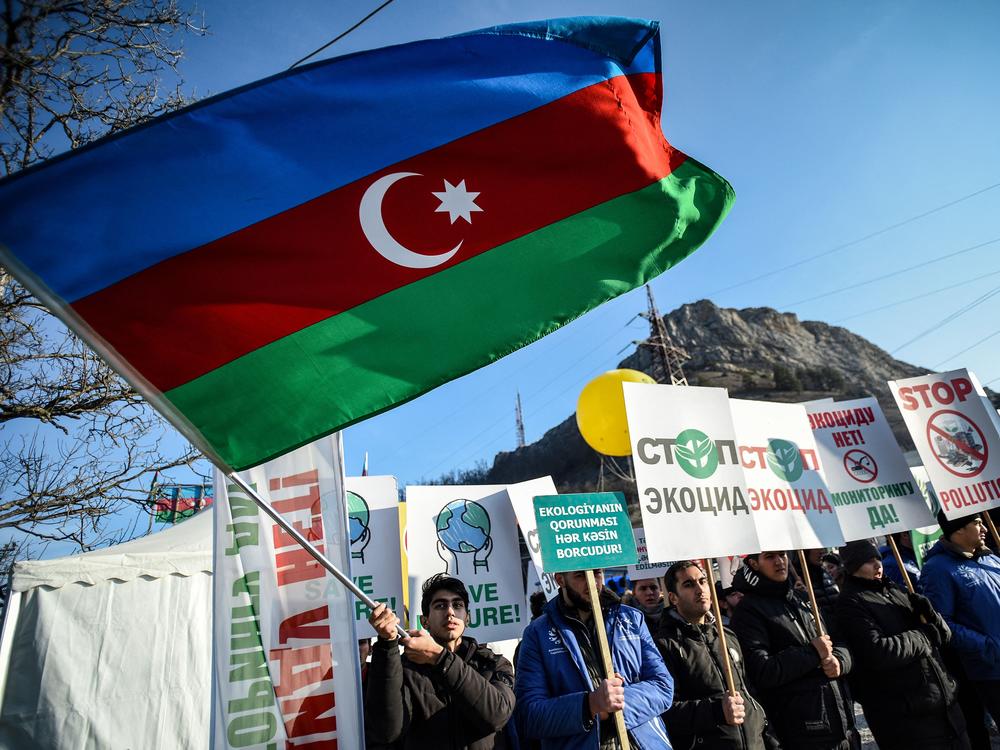Section Branding
Header Content
Azerbaijan’s human-rights record is under fire as it prepares to host UN climate talks
Primary Content
Human rights activists and lawmakers in the United States are calling for Azerbaijan to end alleged abuses of civil society groups and ethnic Armenians ahead of a global climate change summit the country will host in November.
A new report from Human Rights Watch and Freedom Now says Azerbaijan is carrying out an “escalating crackdown” on government critics and activists. That includes the arrest this spring of human-rights advocate Anar Mammadli, who co-founded a group to work on issues related to climate justice.
The report was published days after dozens of U.S. lawmakers urged Secretary of State Antony Blinken to push for the release of political prisoners and hostages in Azerbaijan, a major oil and gas producer on the Caspian Sea that borders Russia, Iran and Armenia. The lawmakers said Azerbaijan carried out an ethnic cleansing last year in Nagorno-Karabakh, an Armenian-majority enclave. And they pointed to a State Department report that found “significant human rights issues” in the country, including credible reports of arbitrary detentions and unlawful or arbitrary killings.
U.S. lawmakers told Blinken that the upcoming COP29 climate negotiations in Azerbaijan offer “a pivotal platform” to promote energy security in the region and to help countries like Armenia cut their dependence on Russia for natural gas. The criticism of Azerbaijan also comes against the backdrop of growing concern globally that grassroots efforts to limit and adapt to climate change are being met with state pushback and human rights abuses.
“When civic space is actively shut down, the voices of those most affected by the climate crisis are at risk of being excluded from the negotiations,” Myrto Tilianaki, a senior advocate for the environment and human rights at Human Rights Watch, said at a press conference Tuesday. “And that is a major problem, because if their lived experiences and solutions aren’t heard, the policies that come out of these talks might not fully reflect their needs or protect their rights.”
Azerbaijan’s embassy in Washington disputed the report from Human Rights Watch and Freedom Now. It said all of the cases are being handled appropriately, and that it "goes against the rule of law to try to interfere with ongoing domestic legal processes."
Responding to the earlier allegations from U.S. lawmakers, the embassy said Azerbaijan is a victim of an “orchestrated disinformation campaign.”
The selection of Azerbaijan to host this year’s climate talks shows the country is “a responsible and credible member of the international community,” the embassy said in a statement. It added that “human rights have nothing to do with permissiveness to engage in illegal activities.”
The report from Human Rights Watch and Freedom Now says recent arrests of activists and media figures in Azerbaijan were primarily linked to laws restricting nongovernmental organizations (NGOs). The arrests were politically motivated, the report says, and “follow well-established, abusive methods the government has used for many years to curtail freedom of speech and freedom of association in the country.”
In most of the cases documented in the report, people who worked for or were involved with unregistered NGOs and independent media outlets were charged with smuggling money into Azerbaijan. Some of those people were also charged with crimes such as illegal entrepreneurship, forgery and tax evasion, according to the report. In other cases, people were charged with extremism, drug possession, counterfeiting and treason.
The circumstances and timing of most of those arrests “strongly suggest that the criminal charges were merely a pretext intended to punish and put an end to activists’ legitimate work,” according to Human Rights Watch and Freedom Now.
Azerbaijan was picked to host this year’s United Nations climate talks after Russia blocked bids from countries in the European Union, which has supported Ukraine in its war with Moscow.
At last year’s climate conference in the United Arab Emirates, countries agreed to move away from fossil fuels, the main driver of human-caused global warming. However, Azerbaijan has suggested the world can meet its climate targets while continuing to produce fossil fuels.
Oil and gas pays for a large share of Azerbaijan’s budget, and the country is poised to increase gas production by a third over the next decade, according to an analysis by Global Witness, an environmental and human rights group.
“I have always said that having oil and gas deposits is not our fault. It's a gift from God,” Ilham Aliyev, president of Azerbaijan, said at a conference earlier this year. “We must not be judged by that. We must be judged based on how we use these reserves for the development of the country, to reduce poverty and unemployment, and on what our targets are with respect to the green agenda.”
One of the cases highlighted by Human Rights Watch and Freedom Now involves an economist named Gubad Ibadoghlu who was arrested on charges related to the production of counterfeit currency and extremism. Ibadoghlu has argued that average citizens in Azerbaijan don’t benefit from the country’s oil and gas reserves because revenues are mismanaged. And he recently examined plans for greater energy cooperation between Azerbaijan and the European Union, questioning how much gas Azerbaijan could send to Europe. If he’s convicted, the report says Ibadoghlu faces 17 years in prison.

